As a parent, one of the biggest challenges you’ll face in the early months of your baby’s life is ensuring they get adequate, restful sleep. Infants often struggle to establish a consistent sleep routine, leaving both baby and parents feeling exhausted. If you’ve found yourself searching for ways to help your baby sleep better, you may have come across the option of sleep drops for infants.
In this comprehensive guide, we will explore what sleep drops for infants are, how they work, their potential benefits, and how they can help your baby settle into a peaceful night’s sleep. If you are considering using drops for infants to sleep, this article will provide you with the necessary information to make an informed decision that suits both your baby’s needs and your parenting style.
Table of Contents
Understanding Infant Sleep Patterns
Before we dive into sleep aids, it’s crucial to understand how infant sleep works and why your baby may be struggling to sleep soundly.
The Sleep Cycle of Infants
Unlike adults, newborns and young infants have shorter sleep cycles, usually lasting around 50-60 minutes, which means they spend a significant amount of time in lighter sleep stages. As a result, they often wake up every 1-2 hours throughout the night. While this is normal and part of the developmental process, it can lead to significant sleep disruption for both the baby and the parents.
Infants also experience a lot of rapid eye movement (REM) sleep, which is critical for brain development. However, the transition from one sleep cycle to the next can sometimes be difficult for babies, leading to wake-ups and difficulty falling back asleep.
Common Sleep Challenges for Parents
Many parents face challenges such as frequent night wakings, difficulty getting their baby to fall asleep, or trouble establishing a regular sleep schedule. These issues often leave parents feeling frustrated and exhausted. As sleep-deprived parents, it can be difficult to find solutions that are safe and effective.
Whether it’s an overactive nervous system, hunger, or discomfort, babies often struggle to get the deep, restorative sleep they need. This is where sleep drops for infants can potentially help.
Discover the top 4 books on infant sleep that can help you establish a peaceful bedtime routine and ensure your baby sleeps through the night.
How Sleep Drops for Infants Can Help
Sleep drops for infants are designed to ease these common sleep disruptions by calming your baby’s nervous system and helping them fall into a deeper, more peaceful sleep. These natural solutions are often made with safe, gentle ingredients like chamomile, melatonin, and lavender, all known for their calming effects.
For parents who are struggling with a restless infant, drops for infants to sleep offer a gentle, non-habit-forming solution to help promote better sleep.
What Are Sleep Drops for Infants?
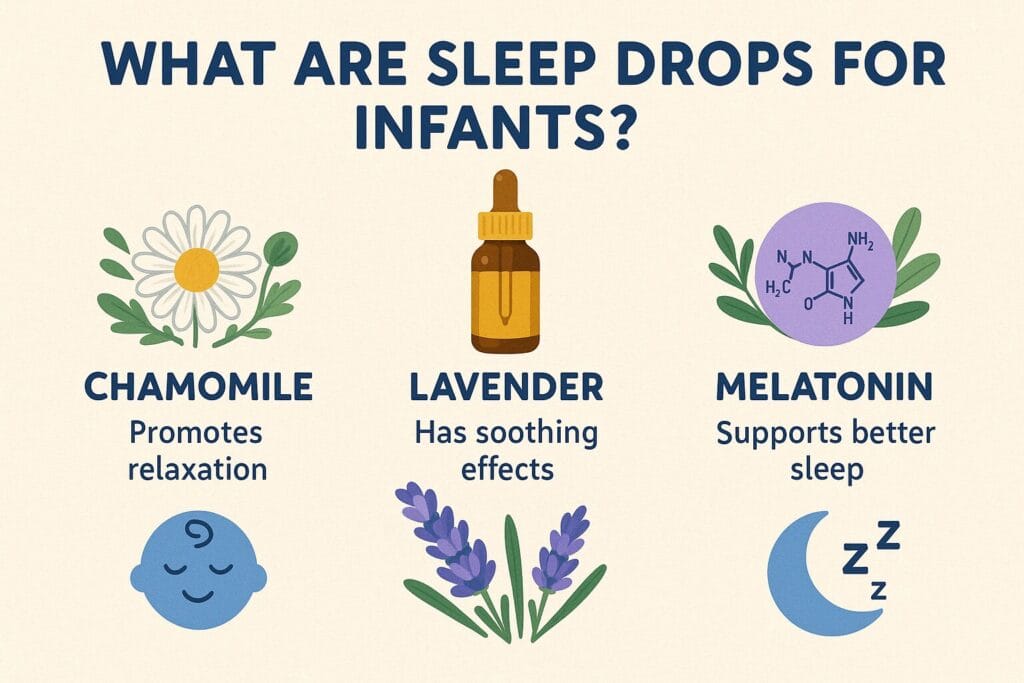
What Ingredients Are Commonly Found in Sleep Drops for Infants?
Sleep drops for infants typically contain natural ingredients known for their soothing properties. These ingredients may include:
- Chamomile: Widely known for its calming properties, chamomile can help reduce anxiety and promote relaxation in babies.
- Lavender: Known for its soothing and sleep-inducing effects, lavender is often used in both oils and sleep drops to promote relaxation.
- Melatonin: A naturally occurring hormone, melatonin helps regulate the sleep-wake cycle and can support a smoother transition into sleep.
These ingredients work together to help your baby feel calm and relaxed, making it easier for them to fall asleep and stay asleep for longer stretches.
Are Sleep Drops Safe for Babies?
When used correctly and according to the manufacturer’s instructions, sleep drops for infants are generally considered safe. However, not all sleep drops are created equal. It’s important to choose products that are specifically designed for infants, as adult formulations can contain ingredients that are too strong for a baby’s developing body.
Before using any sleep aid, always consult with your pediatrician to ensure that the product is safe for your baby and suitable for their specific age and health needs.
How Do Drops for Infants to Sleep Work?
Drops for infants to sleep work by promoting relaxation and calming your baby’s nervous system. When administered as directed, these drops can help ease the transition from wakefulness to sleep, making it easier for your baby to fall asleep on their own and stay asleep for longer periods.
These natural sleep aids don’t induce drowsiness in the way that medications might; rather, they create a sense of calm that helps your baby’s body naturally settle into sleep.
Benefits of Using Sleep Drops for Infants
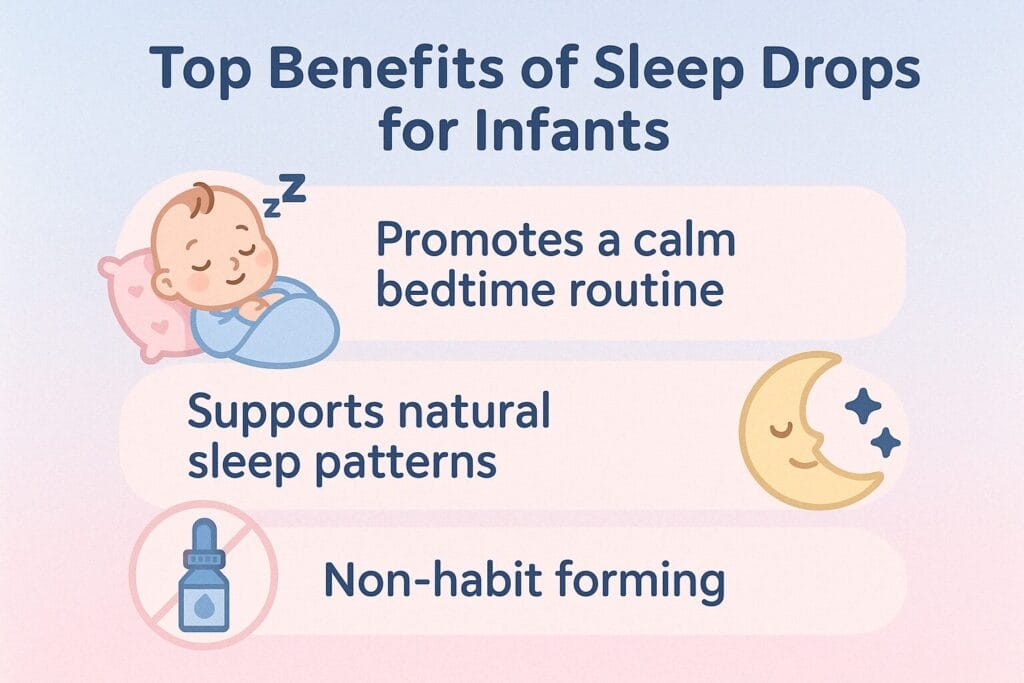
Promotes a Calmer Bedtime Routine
One of the biggest advantages of using sleep drops for infants is the ability to establish a calming bedtime routine. Babies thrive on consistency, and using sleep drops as part of a soothing bedtime ritual can signal to your baby that it’s time to wind down and prepare for sleep. When combined with activities like a warm bath, soft music, or gentle rocking, sleep drops can make bedtime more peaceful and relaxing.
Supports Natural Sleep Patterns
Unlike medications that may alter the body’s natural rhythms, sleep drops for infants support the body’s natural sleep patterns. By helping your baby relax and fall asleep on their own, these drops can support long-term, healthy sleep habits. They don’t rely on harsh chemicals or sedatives, making them a safer option for parents looking for natural alternatives.
Gentle and Non-Habit Forming
Sleep drops for infants are generally non-habit-forming, meaning your baby won’t become reliant on them to fall asleep. These drops provide a gentle nudge to help your baby relax, but once the sleep routine is established, you may not need to use them regularly. The goal is to help your baby establish healthy sleep habits, and sleep drops are a tool to aid in that process without becoming a crutch.
Newborns rolling onto their side while sleeping can be a concern, but these 5 safety tips will help you create a secure and restful environment.
Choosing the Right Sleep Drops for Your Infant
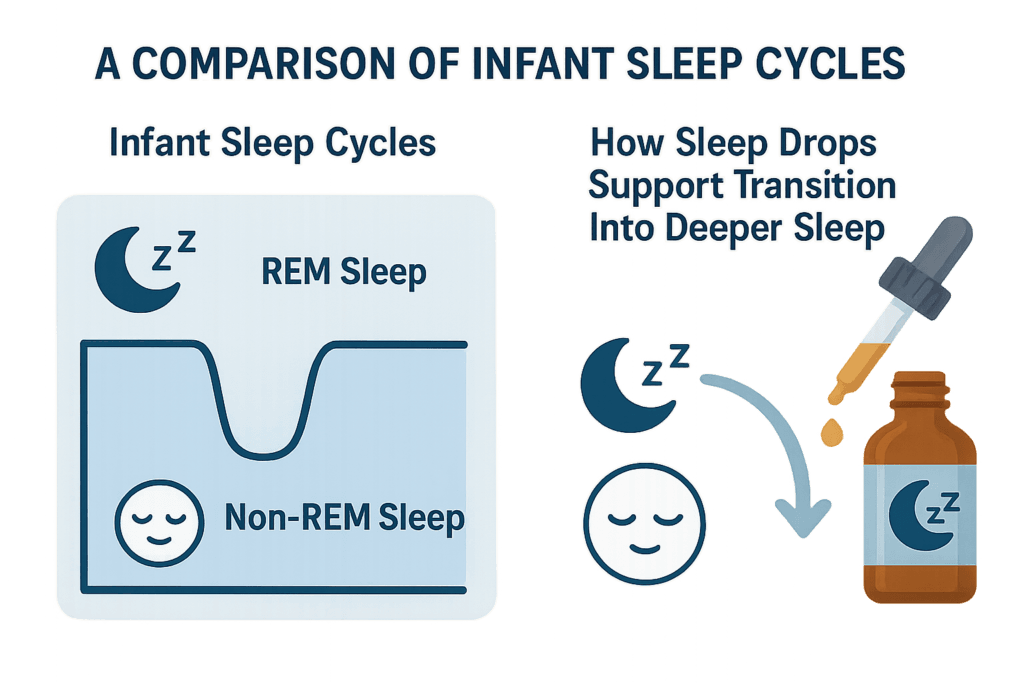
Not all sleep drops are the same, so it’s essential to choose the right product for your baby.
Factors to Consider When Selecting Sleep Drops
When looking for sleep drops for infants, there are a few factors you should keep in mind:
- Ingredients: Opt for sleep drops made with natural, safe ingredients that are specifically formulated for babies. Avoid products with artificial additives or chemicals that may be too harsh for your infant.
- Age Appropriateness: Be sure to choose a product that is suitable for your baby’s age. Some sleep drops are formulated for newborns, while others may be more appropriate for older infants.
- Brand Reputation: Look for brands that are trusted by parents and pediatricians. Choose products that have been tested for safety and efficacy.
Consulting Your Pediatrician Before Use
Before introducing any sleep aid, including drops for infants to sleep, it’s always a good idea to consult with your pediatrician. They can guide you on whether sleep drops are appropriate for your baby’s specific needs and help ensure you’re selecting a safe and effective product.
Trusted Brands and Recommendations
There are several reputable brands that specialize in creating safe, natural sleep aids for babies. These brands offer products that have been tested for safety and are often recommended by pediatricians. By choosing a trusted brand, you can feel confident that the sleep drops for infants you’re using are safe and effective.
How to Use Sleep Drops for Infants Safely
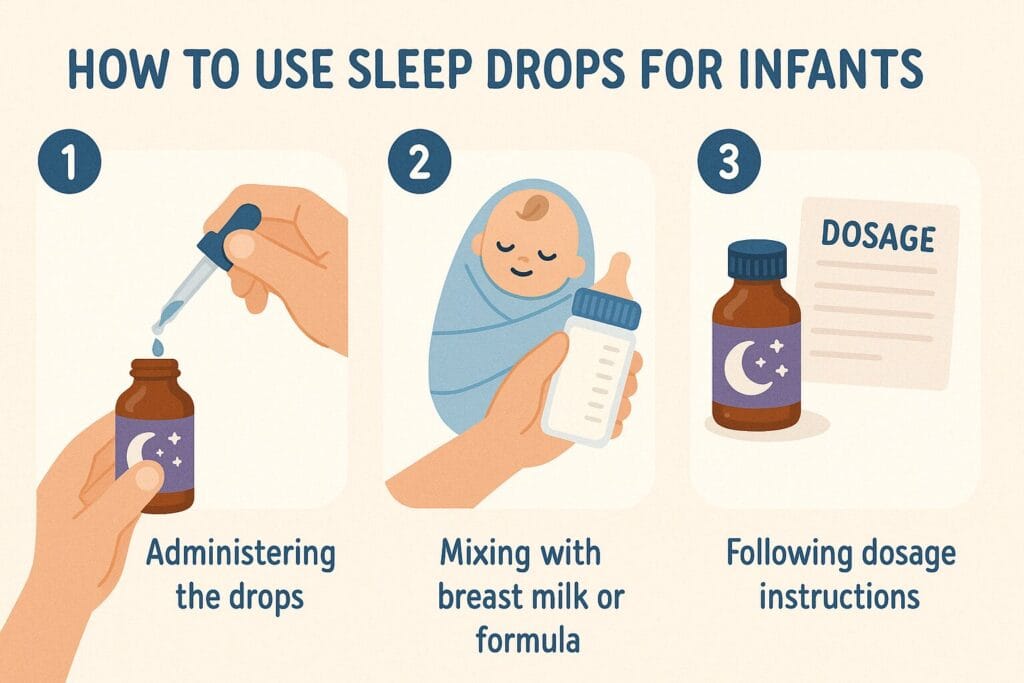
How to Administer Sleep Drops to Your Baby
When using sleep drops for infants, always follow the instructions on the packaging carefully. Typically, the drops are taken orally, either directly or mixed with a small amount of liquid, such as breast milk or formula. Some drops may come with a dropper for easy administration.
It’s essential to avoid giving your baby more than the recommended dosage, as too much can have unintended side effects.
When to Use Sleep Drops
Sleep drops for infants should be used as part of a regular bedtime routine. Avoid using them sporadically for occasional sleep disturbances, as establishing a consistent bedtime ritual is essential for long-term sleep success. Using the drops regularly will help your baby’s body become accustomed to a predictable sleep routine, making it easier for them to settle into sleep each night.
Signs to Watch Out For
While sleep drops for infants are generally safe, it’s important to monitor your baby for any signs of discomfort or an adverse reaction. If your baby seems unusually drowsy, irritable, or has trouble waking up after using the drops, stop using them and consult with your healthcare provider.
From promoting healthy sleep positions to ensuring a cozy resting spot, an infant sleeping pillow can enhance both comfort and safety for your baby.”
The Bottom Line: Are Sleep Drops for Infants Right for Your Family?
Ultimately, whether or not sleep drops for infants are the right choice for your family depends on your baby’s unique needs and your parenting approach. These natural sleep aids can be a valuable tool for parents looking to establish a calming bedtime routine and promote better sleep for their infants.
However, it’s important to remember that sleep drops for infants are just one part of the equation. Establishing a consistent bedtime routine, maintaining a peaceful sleep environment, and following safe sleep practices are all crucial to ensuring your baby gets the rest they need.
If you’re struggling with a baby who has trouble sleeping, drops for infants to sleep can be a gentle, natural solution to help ease the transition into a peaceful night’s sleep. By consulting with your pediatrician and choosing a trusted, natural sleep aid, you can provide your baby with the restful sleep they need for healthy growth and development.
Frequently Asked Questions (FAQs) About Sleep Drops for Infants
1. What are sleep drops for infants and how do they work?
Sleep drops for infants are natural, liquid sleep aids designed to help babies relax and fall asleep more easily. These drops typically contain ingredients like chamomile, lavender, and melatonin, which are known for their calming effects. They work by soothing your baby’s nervous system and promoting a smoother transition into sleep.
2. Are sleep drops for infants safe to use every night?
When used according to the manufacturer’s instructions, sleep drops for infants are generally considered safe for nightly use. However, it’s always best to consult your pediatrician before starting any new sleep aid, especially if you’re planning to use it consistently. Your doctor can provide personalized guidance based on your baby’s age and health needs.
3. At what age can I start using sleep drops for infants?
Most sleep drops for infants are suitable for babies as young as 6 months old, though some products may be formulated for older infants. Always check the product’s label for recommended age ranges and consult your pediatrician to ensure it’s appropriate for your baby’s age and development.
4. Can sleep drops for infants help with colic or gas pain?
While sleep drops for infants are designed to help with sleep, they do not directly address issues like colic or gas pain. However, the calming effects of some ingredients, like chamomile, may help ease mild discomfort and promote relaxation, potentially making it easier for your baby to sleep despite mild stomach issues.
5. Can sleep drops for infants be used with other medications?
Before using sleep drops for infants alongside other medications, it is crucial to consult your pediatrician. Some medications may interact with the ingredients in sleep drops, so professional guidance is necessary to ensure the safety and efficacy of both treatments.
6. Are sleep drops for infants non-habit forming?
Yes, sleep drops for infants are generally non-habit forming. These drops are meant to help babies relax and fall asleep naturally, without causing dependency. When used as part of a consistent bedtime routine, they can support the development of healthy sleep patterns without the risk of your baby becoming reliant on them.
7. How should I administer sleep drops for infants?
Sleep drops for infants are typically administered orally, either directly or by mixing the drops with a small amount of breast milk, formula, or water. Follow the instructions on the product packaging for proper dosage, and always use the provided dropper to ensure the correct amount is given.
8. Do sleep drops for infants work immediately?
The effectiveness of sleep drops for infants can vary depending on the baby. Some babies may feel relaxed and fall asleep more easily within minutes, while others might take a bit longer. Consistent use as part of a bedtime routine often leads to better results over time.
9. Can I use sleep drops for infants during teething or sickness?
While sleep drops for infants can help with sleep disturbances caused by discomfort, they are not a remedy for the underlying issues like teething or illness. If your baby is teething or sick, consult your pediatrician to ensure you’re using the right products to address their specific needs while promoting sleep.
10. Can sleep drops for infants replace a bedtime routine?
Sleep drops for infants should not replace a consistent bedtime routine. Instead, they can be used as a supportive tool to complement other sleep practices, such as a warm bath, reading, or gentle rocking. A solid bedtime routine, combined with the calming effects of sleep drops, can help your baby establish healthy sleep habits.
Conclusion: Embracing the Benefits of Sleep Drops for Infants
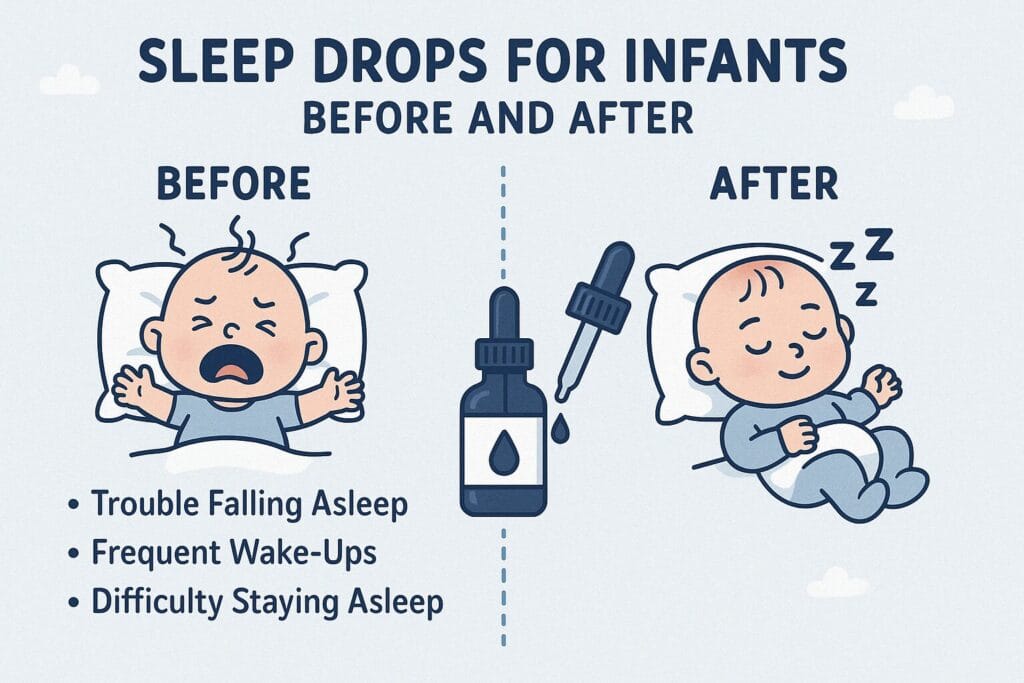
The first few months of parenthood can be incredibly challenging, particularly when it comes to helping your baby get the restful, uninterrupted sleep they need. Sleep drops for infants have emerged as a natural solution that can help babies fall asleep more easily and stay asleep longer, providing relief for exhausted parents. As we have explored in this article, sleep drops for infants can be a helpful tool in your baby’s bedtime routine, providing a calming, soothing effect that encourages better sleep for your little one.
Sleep drops for infants typically contain natural ingredients like chamomile, lavender, and melatonin, all of which are known for their relaxing properties. By supporting the natural sleep cycle and calming your baby’s nervous system, these drops work to promote a smoother transition into sleep. This can result in longer stretches of restful sleep for your baby, which is essential for their growth and development. Moreover, parents who use drops for infants to sleep often report that their babies experience fewer wake-ups during the night, allowing both the baby and the parents to get more rest.
The benefits of sleep drops for infants extend beyond just helping babies fall asleep. By incorporating these drops into your child’s bedtime routine, you can establish a more peaceful and calming environment that signals to your baby that it’s time for sleep. A consistent, soothing bedtime routine, combined with sleep drops for infants, can help babies wind down more easily and avoid the stress of bedtime struggles. This routine can be the key to building long-term, healthy sleep habits.
It’s essential, however, to choose sleep drops for infants that are specifically formulated for babies. These drops are made with gentle ingredients that are safe for your baby’s developing system. Always check the product label and follow dosage instructions carefully. Since babies’ needs vary, it is recommended that you consult with your pediatrician before introducing drops for infants to sleep to your baby’s routine. Your doctor can help you choose the right product and ensure that it will be beneficial for your baby’s health and sleep habits.
One of the key reasons why sleep drops for infants are so popular among parents is their non-habit-forming nature. Unlike some other sleep aids, sleep drops for infants help your baby relax without creating dependency. Over time, as your baby establishes healthier sleep patterns, you may find that you can use these drops less frequently. The goal is to make bedtime smoother and help your baby develop good sleep habits that last into the future.
However, while sleep drops for infants can be highly effective, it’s important to remember that they are only one part of the sleep equation. Establishing a consistent sleep schedule, creating a quiet, comfortable sleep environment, and following a calming bedtime routine are all essential for ensuring your baby gets the best sleep possible. Drops for infants to sleep should be used as a tool to enhance these efforts, not as a replacement for healthy sleep habits.
In conclusion, sleep drops for infants offer a safe, gentle, and natural solution for parents who are looking for ways to help their babies sleep better. By incorporating drops for infants to sleep into a consistent bedtime routine, you can create a calming, predictable environment that helps your baby transition into sleep more easily. Always consult with your pediatrician before starting any new sleep aid, and be sure to choose the right product for your baby’s needs. With the right approach, sleep drops for infants can help improve your baby’s sleep, restore peace to your home, and give you the rest you need as a parent.



